9 Bosch Dishwasher Wash Cycles (How Long & Hot) – Pros & Cons
If you have a Bosch dishwasher, you’ve likely noticed how efficient and reliable it is in cleaning your dishes. To help you make the most of your dishwasher, it’s essential to understand its various cycles. In this guide, we will explore the different Bosch dishwasher cycles, giving you detailed insight into each one.
With a Bosch dishwasher, you can choose from several cycles, including auto wash, rise-only cycle, heavy wash, sanitize cycle, delicate wash, normal wash, and express wash. Most models come with five primary cycles and additional add-ons for drying and sanitization.
Read on to learn more about the specifics of how long each wash cycle is, how hot they gets, pros, cons, and more about the most useful appliance sitting on the kitchen floor!
Bosch dishwasher cycles explained (all 9 of them!)
Most new Bosch dishwashers offer nine different wash cycles to cater to a variety of cleaning needs. From “Auto Wash,” which uses sensors to adjust settings for mixed loads, to “Sanitize Cycle,” which uses high heat to kill bacteria, each cycle has its pros and cons.
“Express Wash” and “Quick Wash” are designed to use less water and for speed and lightly soiled items, while “Heavy Wash” and “Normal Wash” aim for thorough cleaning of super dirty dishes.
“Delicate Wash” is designed to carefully clean fragile items. “Eco Mode” is focused on lower energy usage and water conservation, and “Rinse-only Cycle” offers a quick rinse before full washing.
| Cycle Name | Duration (Minutes) | Temperature (°F) | Ideal For | Energy Efficiency | Limitations |
|---|---|---|---|---|---|
| Auto Wash | 95-135 | 113-149 | Mixed Loads | Moderate | Varies, not specialized |
| Heavy Wash | ~135 | ~162 | Heavily Soiled Dishes | Low | Long runtime, higher energy |
| Delicate Wash | ~80 | Wash: 122, Rinse: 156 | Delicate Items | Moderate | Longer time, less effective for tough stains |
| Express Wash | ~30 | Varies | Lightly Soiled Items | High | Not for heavy cleaning, small loads |
| Normal Wash | ~120 | 122-140 | Everyday Dishes | Moderate | Not for heavily soiled dishes |
| Sanitize Cycle | ~90 | ~162 | Sterilization | Low | High energy, not for all dishware |
| Rinse-only | Short | Hot | Quick Rinse | High | Not for heavy cleaning |
| Eco Mode | Varies | ~122 | Eco-Friendly | High | Longer duration |
| Quick Wash | 30-60 | 104-122 | Lightly Soiled Items | High | Not for heavily soiled dishes, small loads |
This table summarizes the key features, benefits, and limitations of each cycle to help you choose the right one for your needs.
1. Auto Wash
Adapts to varying levels of dirtiness using sensors and is ideal for mixed loads but not specialized for extreme cases.
How Long is It?
The Auto Wash cycle typically runs for 95 to 135 minutes, but the exact duration depends on the dishwasher’s sensors, which assess the dishes’ dirtiness and adjust the cycle accordingly.
How Hot is It?
The Auto Wash cycle adjusts water temperature between 113°F and 149°F to clean dishes effectively.
Pros
- Automatically adapts the settings based on the dirtiness of your dishes.
- Ideal for mixed loads with varying levels of dirt.
- The sophisticated sensors adjust water temperature, allowing energy-efficient cleaning.
Cons
- Cycle duration may vary, making it harder to predict the exact runtime.
- Not specialized for extremely heavy or delicate loads, so specific cycle settings may be more suitable for these cases.
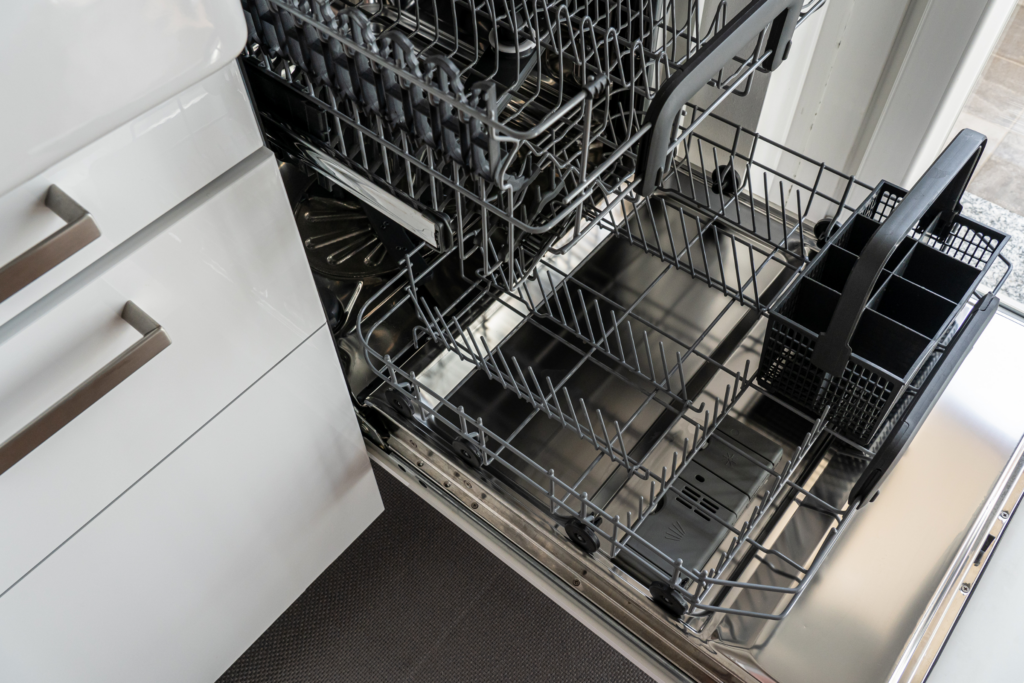
2. Heavy Wash
Specifically designed for heavily soiled dishes, this cycle uses high temperatures and extended time to ensure thorough cleaning.
How long is it?
The Heavy Wash cycle in Bosch dishwashers typically takes around 135 minutes to finish and typically is the cycle option with the longest cycle length. This lengthy duration ensures optimal cleaning for heavily soiled dishes, pots, and pans with baked-on food.
How hot is it?
During the Heavy Wash cycle, the dishwasher uses water heated to approximately 162°F (72°C) to ensure thorough cleaning and rinsing of your dishes.
Pros
- Thorough cleaning: The Heavy Wash cycle is designed to clean even the largest load of heavily soiled dishes, pots, and pans, reducing the need for manual soaking and scrubbing.
- High temperature: The hot water used in this cycle helps to break down tough food debris and stains, making it more effective for cleaning heavily soiled items.
Cons
- Long runtime: The Heavy Wash cycle takes longer than other cycles, around 135 minutes, which might not be ideal if you’re in a hurry.
- Higher energy consumption: As this cycle requires more time and higher water temperature to perform effectively, it might result in higher energy consumption compared to other cycles.
3. Delicate Wash
Tailored for fragile items like knits or handmade items, this cycle is not as effective for tough stains.
How long is it?
In the delicate wash cycle, your Bosch dishwasher runs for approximately 80 minutes to ensure the proper cleaning of your fragile items without damaging them.
How hot is it?
This cycle uses gentler temperatures to protect your delicate dishware. The washing phase happens at 122°F, while the rinsing phase occurs at 156°F.
Pros
- It’s specifically designed for delicate items such as china, crystal, and glassware.
- The lower temperature settings help protect fragile dishes from cracking or breaking.
- Ideal for lightly stained delicate objects that require gentle cleaning.
Cons
- It may not be as effective in removing tough stains or heavy dirt from your dishes.
- The cycle takes longer (80 minutes) compared to other wash options like Express Wash.
Remember to use the Delicate Wash cycle when you need to clean your precious heirlooms and delicate glassware, and enjoy the assurance that your items are being treated with care.
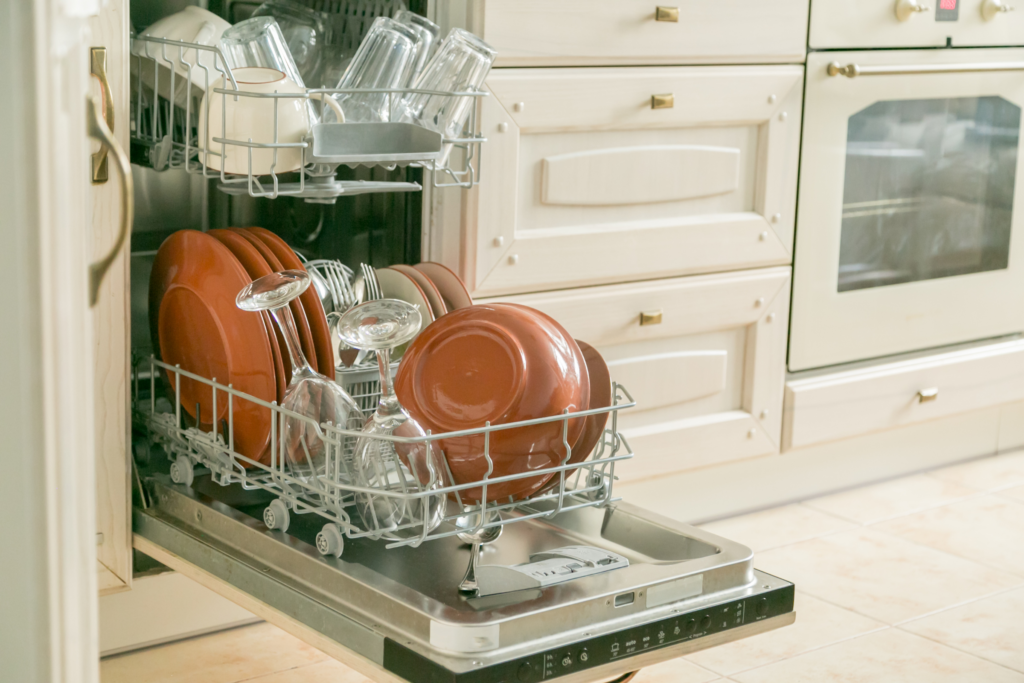
4. Express Wash
Aimed at quickly cleaning lightly soiled items, this cycle is perfect when you’re short on time, but not suitable for heavy cleaning.
How long is it?
The Express Wash cycle in a Bosch dishwasher is designed for cleaning lightly soiled items quickly, taking approximately 30 minutes to complete.
How hot is it?
This cycle operates with a moderate temperature, as it is meant for lightly soiled dishware and glassware. The precise temperature may vary based on specific Bosch dishwasher models.
Pros
- Fast: The Express Wash is the quickest cycle available for Bosch dishwashers, perfect when you’re short on time.
- Ideal for light stains: It effectively removes light stains from dishware, glassware, and utensils, such as wine glasses or lightly soiled plates.
- Energy-efficient: As it takes less time, the Express Wash cycle can help save energy compared to longer cycles.
Cons
- Not for heavy cleaning: The Express Wash is not meant to tackle thick layers of grease or heavily soiled items.
- Limited capacity: This cycle may not be suitable for a full load of dishes, as the cleaning power is optimized for smaller loads of lightly soiled items.
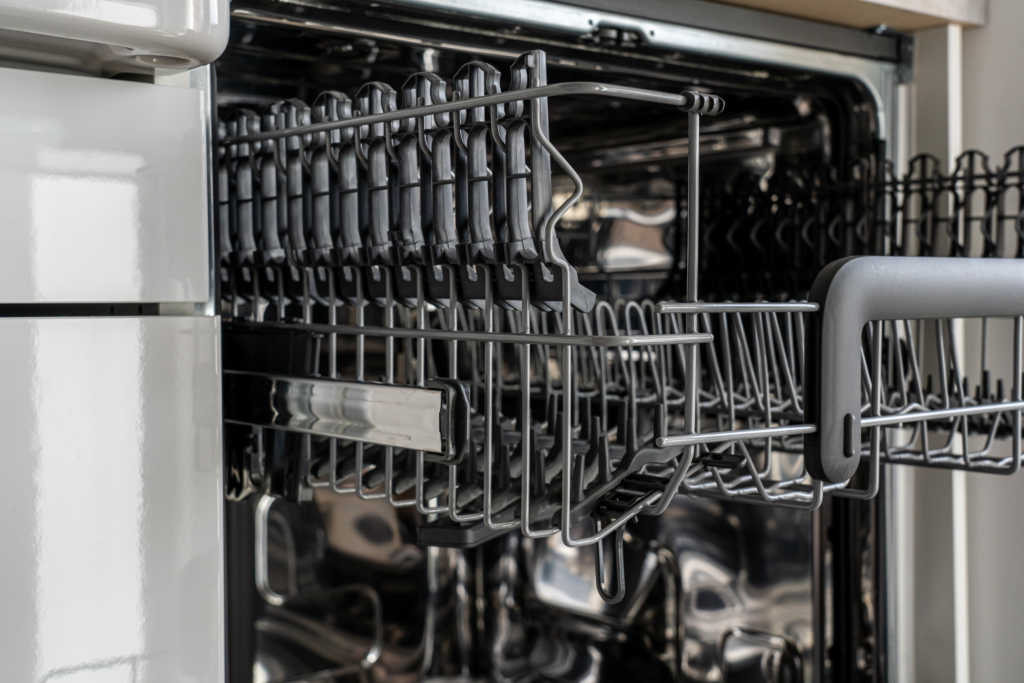
5. Normal Wash
A normal dishwasher cycle for everyday dishes, but it’s not meant for heavily soiled dishes.
How long is it?
The Normal Wash cycle is designed for everyday dishes that don’t require intense cleaning but need more than what delicate or express wash cycles offer. The duration of this cycle may vary depending on your Bosch dishwasher model, but it usually takes around 2 hours.
How hot is it?
In the Normal Wash cycle, the water temperature typically reaches 122-140°F (50-60°C), providing a proper balance between efficiency and cleaning performance for everyday dishes.
Pros
- Ideal for everyday dishes without heavy soiling
- Provides a balanced cleaning performance
- Saves energy compared to heavy wash cycles
Cons
- Not suitable for heavily soiled dishes or those with stuck-on food
- Takes longer than express wash cycles
6. Sanitize Cycle
The sanitizing cycle is usually one of the add-on functions of a dishwasher rather than the main cycle. Useful for sterilizing items like baby bottles but consumes more energy.
How long is it?
The sanitize cycle typically takes around 90 minutes to complete, depending on the Bosch dishwasher model. This time frame ensures a thorough cleaning and sanitization of your dishes.
How hot is it?
During the sanitize cycle, the dishwasher uses higher temperatures for the water and reaches around 162°F (72°C). This high temperature effectively eliminates bacteria and other germs on your dishes, ensuring a hygienic cleaning process.
Pros
- Kills bacteria and germs: The high temperature of the sanitize cycle is effective in eliminating harmful bacteria and germs from your dishes.
- Ideal for baby bottles and cutting boards: The sanitize cycle is especially useful for cleaning items that come in contact with raw food or need to be sterile, such as baby bottles and cutting boards.
Cons
- Higher energy consumption the sanitizing cycle requires higher water temperatures, so it may consume more energy than regular wash cycles.
- Not suitable for all dishware: Some delicate or heat-sensitive dishware may not be suitable for the high temperatures of the sanitize cycle. Always check the manufacturer’s guidelines for your dishware before using this cycle.
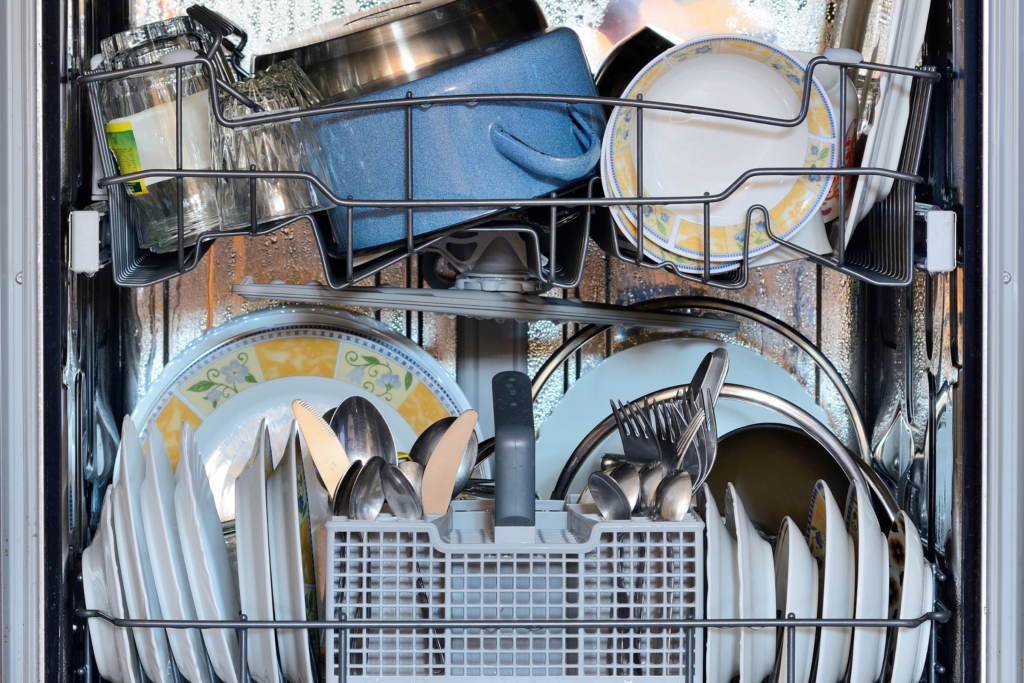
7. Rinse-only Cycle
A quick rinse option that’s energy-efficient but not intended for heavy cleaning. The cycle uses hot water to remove light soil and prevent odors.
How long is it?
The rinse-only cycle on a Bosch dishwasher is very brief, designed for a quick rinse of your dishes. This cycle doesn’t consume much time and is ideal for a light clean before you fully wash your dishes.
How hot is it?
During the rinse-only cycle, your Bosch dishwasher utilizes hot water to quickly rinse your dishes. Different models might have varying temperature ranges, but typically, the water is hot enough to effectively remove light soil and debris.
Pros
- Quick: This cycle saves time, as it’s shorter compared to other dishwasher cycles.
- Energy-efficient: It requires less energy and water, making it cost-effective and eco-friendly.
- Prevents odor: Rinsing your dishes before a complete wash cycle can help prevent odors from developing in the dishwasher.
Cons
- Not for heavy cleaning: Rinse-only cycle is not suitable for removing heavy stains and debris from your dishes.
- Might not remove all residue: Since this cycle only uses hot water, it might not be effective against more stubborn residues.
8. Eco Mode Cycle
Prioritizes energy and water conservation, taking longer to complete while using lower temperatures.
How long is it?
The Eco Mode cycle’s duration depends on the specific Bosch dishwasher model. Keep in mind that this cycle takes longer than regular wash cycles as it is designed to use less energy and water.
How hot is it?
During the Eco Mode cycle, the water temperature is typically around 122°F (50°C). This lower temperature helps conserve energy while still effectively cleaning your dishes.
Pros
- Energy and water conservation: The Eco Mode cycle uses less energy and water than other cycles, making it an eco-friendly choice.
- Gentle cleaning: The lower temperature is suitable for dishes that don’t require aggressive cleaning.
Cons
- Longer cycle duration: As mentioned earlier, the Eco Mode cycle takes longer to complete than standard cycles.
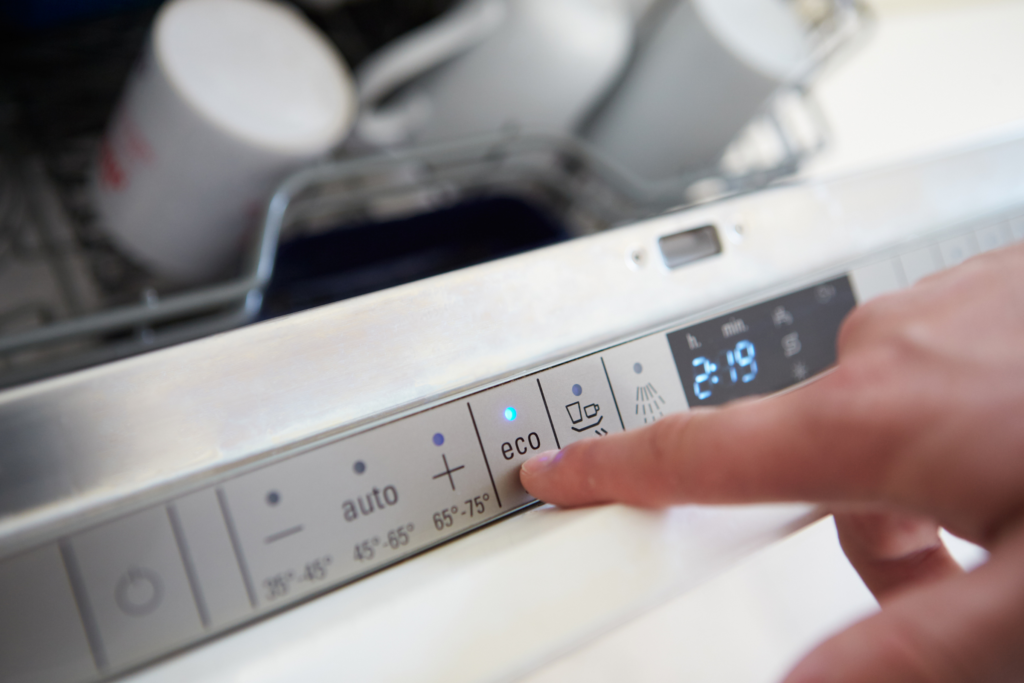
9. Quick Wash Cycle
Designed for lightly soiled dishes and small loads, it’s not suited for heavy soiling or large loads.
How long is it?
The Quick Wash cycle is designed for lightly soiled dishes and typically lasts between 30 to 60 minutes.
How hot is it?
This speedy cycle often uses water heated to approximately 104-122°F (40-50°C), which efficiently removes minor food residue without using excessive energy.
Pros
- Time-efficient: Perfect for when you’re in a hurry and have only lightly soiled dishes.
- Energy-saving: Uses less energy compared to longer and more intensive cycles.
- Ideal for gatherings: Quickly refresh your dishware and utensils for events or parties.
Cons
- Not suitable for heavily soiled dishes: Quick Wash may not sufficiently clean heavily soiled or greasy dishware.
- Limited capacity: This cycle might not be able to handle large loads with optimal results.
Which Bosch Dishwasher Cycle is the Best?
It’s essential to select the right cycle for effectively cleaning your dishes. The cycle mainly depends on:
- The types of dishes and cookware you need to wash
- The amount of dirt you want to remove
- The specific cleaning requirements of your dishes
For everyday dishes with light food residue, the best option is the normal wash cycle. If you’ve hosted a dinner party, and you need to clean numerous dirty pans, opt for the heavy cycle after loading your dishwasher.
When in doubt, consider using the auto dishwasher cycle as the optimal choice for meeting a variety of cleaning needs. Remember to use proper detergent, take advantage of features like delay start and add-ons for drying and sanitization, and adjust settings according to the type of cookware, glassware, or silverware you’re washing.
This way, you’ll ensure the best results for all your dishwashing needs.
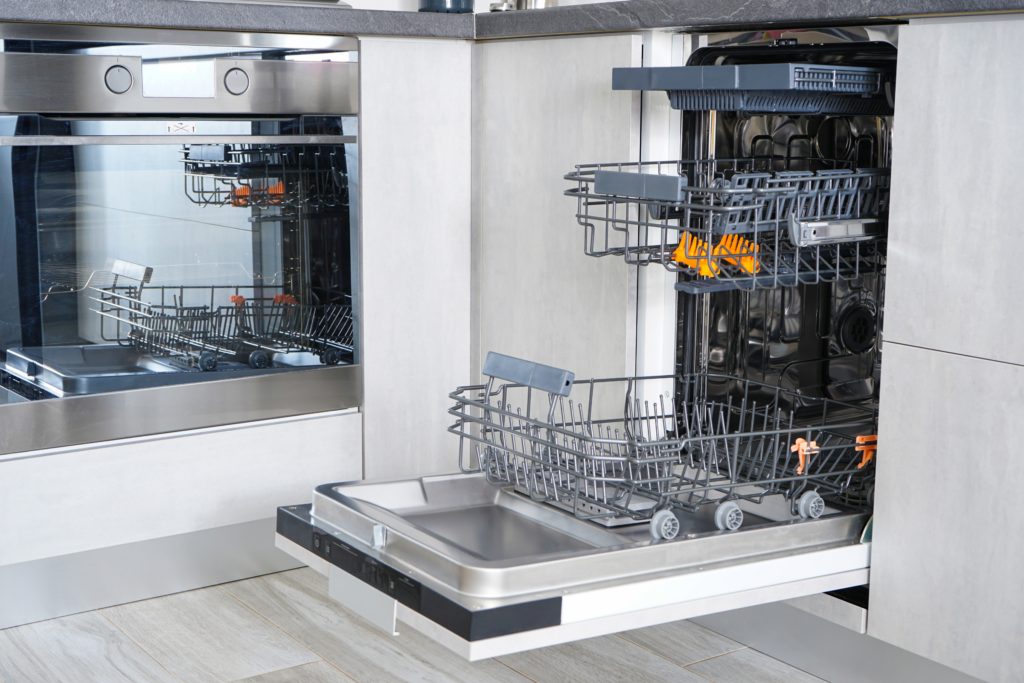
When should you NOT use the auto cycle on a Bosch dishwasher?
While the auto wash cycle on a Bosch dishwasher can be extremely convenient as it adjusts the cycle and temperature according to the dishes’ requirements, there are times when it should not be used:
- If your dishes are mostly lightly soiled and don’t require thorough cleaning, the normal wash cycle may suffice. This shorter cycle, lasting 90 to 115 minutes, is ideal for everyday use and cleaning regular dishes.
- The auto cycle, which lasts 95 to 135 minutes, might not be the best choice for when you need to save time or energy. In cases where you have a smaller load or lightly soiled dishes, the normal cycle is more appropriate.
To decide between using the auto wash and normal wash cycles, assess the level of dirtiness and type of dishes you have.
Utilize the auto wash cycle when you have a mix of dishes with varying soil levels, and opt for the normal wash cycle for lightly soiled or regular dishes without the need for heavy-duty cleaning.
Can You Stop Your Bosch Dishwasher During a Cycle?
Most modern Bosch dishwashers allow you to stop a cycle after it has started, although the specific method may vary depending on the model.
Usually, you can stop a cycle by opening the dishwasher door or pressing a stop, cancel, or pause button on the control panel before you try to open the door.
However, it’s important to exercise caution when interrupting a cycle, especially during high-temperature wash or sanitize cycles, as hot water could spill out and cause burns.
After stopping a cycle, the dishwasher may go through a drain phase before allowing you to open the door completely. Always consult your dishwasher’s user manual for specific instructions and safety guidelines related to interrupting a wash cycle.
What Happens When You Open the Door Mid-Cycle on a Bosch Dishwasher?
When you open the door mid-cycle on most Bosch dishwashers, the machine will automatically pause the wash cycle to prevent water from spilling out. The dishwasher may also engage a drain phase to remove some of the water from the bottom of the appliance. Once the door is opened, the cycle won’t resume until the door is closed again, and you may need to press the start button depending on your specific model.
It’s important to note that interrupting the cycle, especially during high-temperature washes or the sanitize cycle, could potentially expose you to hot water or steam, posing a burn hazard. Always exercise caution and consult your user manual for specific guidance related to your particular model.
Let Us Know How We’re Doing!
Did this expertly prepared resource answer your question?
Do you have another question about home maintenance, home improvement projects, home appliance repair, or something else?
Get more information, send in questions and keep the discussion going by contacting the I’ll Just Fix It Myself company customer service team at at 1-800-928-1490 or Email us at [email protected]
